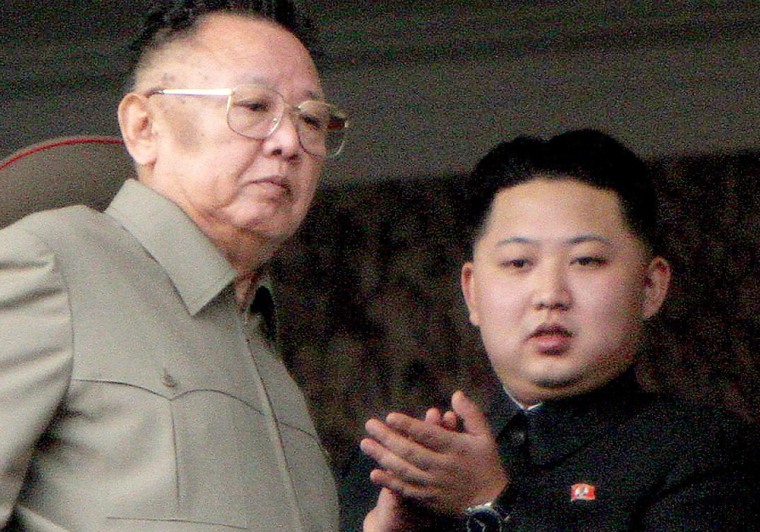North Korea welcomed the new year Saturday with a push for better ties with rival South Korea, warning that war "will bring nothing but a nuclear holocaust."
Despite calls in its annual New Year's message for a Korean peninsula free of nuclear weapons, the North, which has conducted two nuclear tests since 2006, also said its military was ready for "prompt, merciless and annihilatory action" against its enemies.
The North's holiday message — scrutinized by officials and analysts in neighboring countries for policy clues — comes in the wake of its Nov. 23 artillery attack on a front-line South Korean island near the countries' disputed western sea border.
That barrage, which followed an alleged North Korean torpedoing of a South Korean warship in March, sent tensions between the Koreas soaring and fueled fears of war during the last weeks of 2010.
But North Korea called for an end to confrontation with the South and urged a dialogue between the two countries.
"Confrontation between north and south should be defused as early as possible," the three main official North Korean newspapers including Rodong Sinmun said in a joint editorial carried by state news agency KCNA.
"Active efforts should be made to create an atmosphere of dialogue and cooperation between north and south by placing the common interests of the nation above anything else."
Conspicuously absent from the 6,000-word New Year editorial was any specific proposal for talks.
It largely repeated the wording from a New Year editorial 12 months ago, saying: "National reconciliation and cooperation should be promoted actively."
It also repeated that its top priority to remove all nuclear weapons from the Korean peninsula. Two months ago, North Korea revealed advanced efforts to enrich uranium, alarming regional powers because it could offer it a second way to make nuclear weapons-grade material.
"(The North) is consistent in its stand and will to achieve peace in Northeast Asia and denuclearization of the whole of the Korean peninsula," the joint editorial said.
'Nuclear holocaust'
"The danger of war should be removed and peace safeguarded in the Korean peninsula," said the message, which was emphatically read by a North Korean anchorwoman, wearing traditional Korean dress, in a state television broadcast monitored in Seoul. "If a war breaks out on this land, it will bring nothing but a nuclear holocaust."
South Korea's Unification Ministry, which handles relations with North Korea, said its officials were analyzing the North's message; it had no immediate comment.
Four South Koreans, including two civilians, were killed in the November shelling of Yeonpyeong Island, which North Korea carried out after warning Seoul against conducting live-fire drills there. The North denies the charge.
The attack was the first on a civilian area since the 1950-53 Korean War.
The South Korean government has strengthened security and deployed additional troops and weaponry to Yeonpyeong, which lies just seven miles from North Korean shores.
North Korea does not recognize the maritime border drawn by the U.N. in 1953, and it claims the waters around the island as its own. The Korean peninsula remains technically in a state of war because the conflict ended in a truce, not a peace treaty.
South Korean President Lee Myung-bak, dressed in traditional Korean clothes, told his people he was full of hope for 2011.
"I am confident that we will be able to establish peace on the Korean peninsula and continue sustained economic growth," he said in a videotaped message.
Door open to dialogue
Destitute and isolated North Korea walked away from six-party talks aimed at compensating it for steps to dismantle its nuclear program, calling the process dead because of what it said was a U.S. intention to destroy its regime.
It has since pledged a willingness to return to talks, but Washington and Seoul are wary, unwilling to be seen as giving in to Pyongyang's tactic of escalating tension, raising the stakes, then coercing regional powers back to negotiations.
But, after months of tough talk of retaliation, South Korean President Lee Myung-bak has left open the door to dialogue with Pyongyang and said the nuclear crisis should be resolved through the six-way talks involving the two Koreas, the United States, Japan, Russia and China in the new year.
North Korea has twice set off nuclear devices but has yet to show it has a working atomic bomb. Experts doubt it has the ability to miniaturize a weapon to place on a missile.
Few analysts believe the North ever intends to give up the pursuit of nuclear weapons but instead has tried to obtain them as the crowning achievement of leader Kim Jong Il's "military first" rule that has prevented a U.S. invasion.
"Where our side uses its leverage tactically to return to a diplomatic process, North Korea uses its provocations strategically to expand its arsenal and develop nuclear-armed ballistic missiles, with the eventual aim of forcing lasting changes in the existing security apparatus in Northeast Asia," Michael Green of the Center for Strategic and International Studies in Washington, said in a recent column.
"By opportunistically advancing a long-term strategic plan in this way, North Korea has enjoyed most of the initiative over the past two decades," Green, who was on President George W. Bush's team of negotiators on the North, said.
The North's editorial also repeated a pledge to rebuild the economy with the aim of completing a "great, prosperous and powerful country" in 2012 on the centenary of state founder Kim Il-sung's birth.
